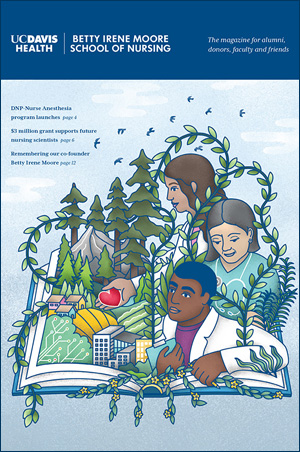SPLICE: System-transforming, Patient-centered, Longitudinal, Interprofessional, Community-based Education
First-year clinical students at the Betty Irene Moore School of Nursing at UC Davis are offered a unique opportunity to experience comprehensive teamwork in both the classroom and simulation as part of the unique SPLICE program (System-transforming, Patient-centered, Longitudinal, Interprofessional, Community-based Education). Through SPLICE, physician assistant (P.A.) students from the School of Nursing join School of Medicine students and medical and pharmacy residents, along with faculty and clinical staff from both schools in innovative, interprofessional educational experiences. The program plans to add Master’s Entry Program in Nursing students into experiential learning activities in the future.
The program targets students who want to work in primary care, especially with underserved populations. SPLICE learners are exposed to community-based health professionals concerned with the social determinants of health and dedicated to health equity. Students participate in a variety of simulations that bring students and residents from different health disciplines together in shared experiential learning and allows them to gain knowledge of their different professions as they practice together.
SPLICE is an enhanced learning opportunity that was launched to develop, test and disseminate a community-based, primary care delivery model to advance the Quintuple Aim: improved quality of care, lower cost of care, improved patient experience and improved clinician and staff experience, and achieve health equity.
Interprofessional practice and education

SPLICE brings together students and faculty from multiple health professions, including nurses, physician assistants, nurse practitioners, physicians and pharmacists.
Students in SPLICE participate in in clinical simulation experiences and workshops. Students also explore a variety of topics through short video presentations, narrated slide shows and facilitated discussions. The clinical simulations are designed to provide learners with the opportunity to practice interprofessional interactions in scenarios commonly encountered in primary care.
The interprofessional educational experiences are scheduled on days when classes are not in session. Educational experiences may be used to meet required clinical hours for the 410 Clinical Skills series for P.A. students and as part of the primary care clinical experience for medical students.
How to apply
First-year P.A. students apply to participate in SPLICE during immersion at the beginning of the academic year. It is a competitive process; those with interest in Primary Care are encouraged to apply. Here are some of the activities that SPLICE offers (see note about SPLICE during the COVID-19 response):
- Participation in focused educational activities related to interprofessional competencies, team-based care, quality improvement and population health
- Learning through case-based simulation experiences with medical students and others
- Access to online education modules to complement the interprofessional activities
- Familiarization with the roles, flow and staffing of an FQHC and ambulatory clinic environments
Interprofessional educational experiences and workshops are scheduled on days when classes are not in session. Education experiences may be used to meet required clinical hours for the 410 Clinical Skills series for P.A. students and as part of the primary care clinical experience for medical students.
Interested? Apply online.
Please email HS-SPLICE@ucdavis.edu for questions or to learn more about the application and selection process.
What students say about SPLICE
- “I love these tabletop simulation cases. In general, I love getting together with the medical students. Overall, great experience.”— P.A. student, Class of 2021
- “This was great and a wonderful prep for OSCE and 410 skills class. It is important to integrate all members into the care.”— P.A. student, Class of 2021
- “This workshop was very helpful. I think these standardized patient scenarios truly help for organizing, solidifying concepts learned in class. Thank you for these sessions!”— P.A. student, Class of 2021
- “Thank you very much. I always enjoy these trainings and find it valuable to becoming a better medical provider.”— P.A. student, Class of 2021
- “SPLICE has been such a valuable supplement to my clinical education. It provided a select few of us to engage in real clinical experiences outside of the classroom and student-run clinics, building our patient-provider skills and overall confidence before entering into rotations. I loved the exposure to different populations working in the refugee clinic and pediatrics clinic… the opportunity to shadow and see patients on my own helped tremendously in preparing me for OSCEs (objective-structed clinical examination), standardized patient encounters and best of all, future practice as a clinician.”— P.A. student, Class of 2020
- “My understanding of primary care strengthened over the past few months and I believe I now understand the trust that needs to be in place to build rapport with patients.”— P.A. student, Class of 2020
- “My most important take away from the clinical rotation at the clinic was teamwork. From medical assistant to physician, everybody worked as a team to provide the best care possible to the patients. …I enjoyed working with different team members and learned a lot about different roles at this clinic. Looking forward for my next rotation.”— FNP student, Class of 2020
- “I really appreciate the opportunity for conversation; it was helpful to hear so many different perspectives. ”— M.D. student, Class of 2025
- “The case and actively working with students in other schools is wonderful.”— M.D. student, Class of 2024
- “I appreciated the learning experience and the feedback provided by the SPs. ”— M.D. student, Class of 2025
- “Having the PharmD [faculty] was great! They provided such an integral part of my case. Their expertise was valued and helped us to better support the patient. ”— M.D. student, Class of 2025
- “As a [first-year medical student] I really enjoyed hearing the perspectives from students in other programs. I felt that they truly brought a different lens to the table, as compared to what i'm used to hearing from other medical students. Would highly encourage for this exercise to continue in future years.”— M.D. student, Class of 2024





